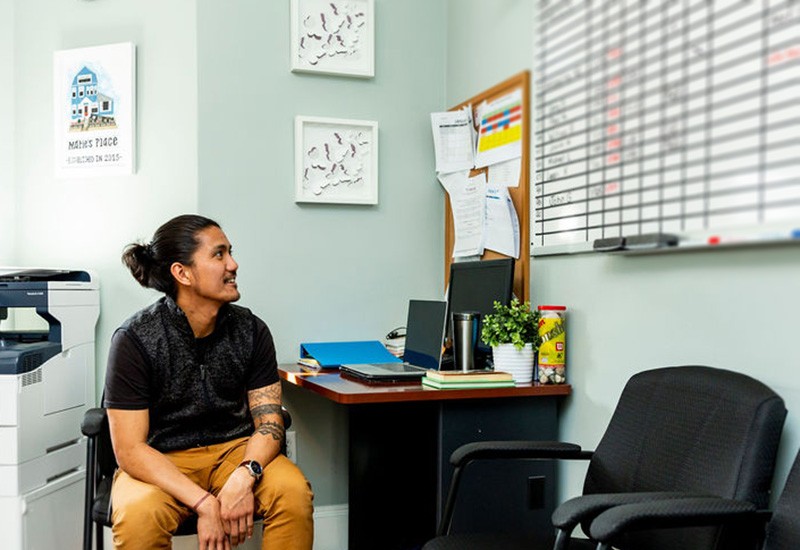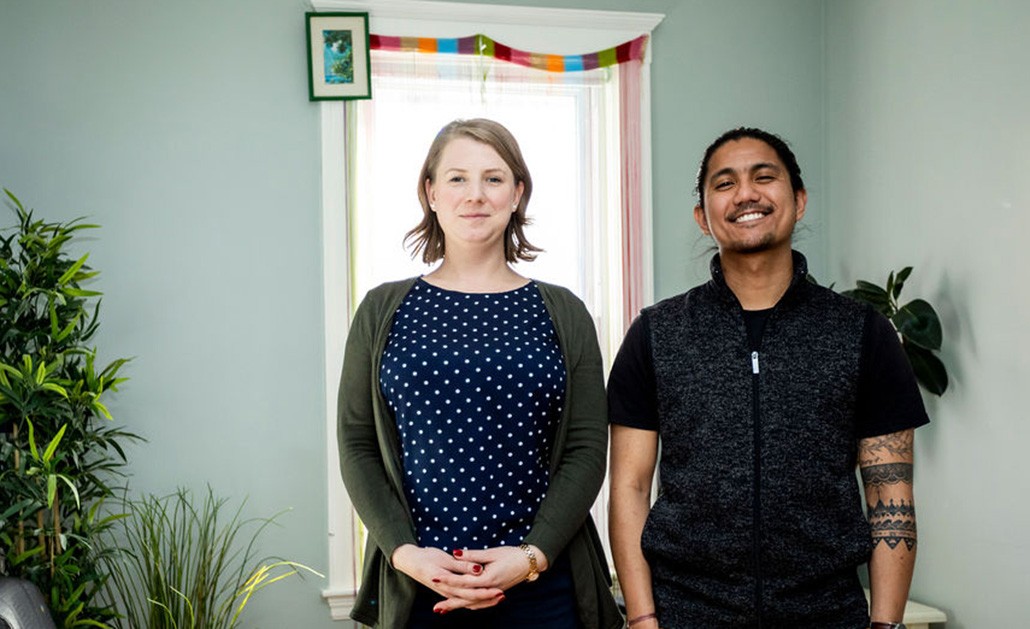Dispatches from the Field is a recurring feature designed to showcase the school’s commitment to fostering, through field education, fruitful relationships with organizations both in Boston and around the world that are providing critical services to those living at the margins of society.

Mookie Manalili at Marie's Place
Student
Michael Mookie C. Manalili
Agency Partnership
Commonwealth Care Alliance, Marie’s Place
Primary Responsibilities
Marie’s Place is a crisis stabilization unit for patients enrolled in Commonwealth Care Alliance’s (CCA) One Care, a program for individuals who are eligible for both MassHealth and Medicare. The 12-bed unit serves patients with complex diagnoses, such as mental health illness, in addition to substance abuse or physical disabilities.
In his field placement, Manalili facilitates mindfulness and seeking safety group sessions, conducts individual counseling sessions, and assists on rounds with the interdisciplinary care team. He often shadows a clinician or fills in as needed to cover morning check-in or a reflection group. “We try to keep it fairly structured,” explains Manalili. “In a time of crisis, it’s nice to feel like the world has some structure to it.”

Leigh Hardy and Mookie Manalili
On Supervision
Manalili’s supervisor at Marie’s Place is Leigh Hardy, a behavioral health specialist. Manalili finds that Hardy’s solution-based approach is a good balance to his focus on mindfulness. “She’s very encouraging, always checks in with what I hope to learn, and is very supportive,” he says. “She goes out of her way to ask what I want to learn and has allowed me to observe aspects of CCA, which is extremely helpful as I try to figure out what I’m drawn to.”
Key Takeaways
Manalili came to BCSSW with an undergraduate degree in civil engineering from Loyola Marymount University, a master’s degree in theology through Notre Dame's Echo program, and a background in teaching and campus ministry retreat work, all of which he draws upon at Marie’s Place. “Combining those aspects, I realized I have a propensity for group work. The high school teacher in me comes out—a calmness and ability to bring out the best in people,” says Manalili. The experience has challenged his skillset and shifted his perception of success away from tangible measures such as attendance and feedback. “I realized it was about creating a space for them to communicate with the concepts, not about my ability to facilitate,” he explains. “They know their stories; they’re resilient. Remembering their humanity has made me a better group facilitator.”
Manalili is particularly grateful to the entire team—the nurse managers, nurse practitioners, mental health workers, social workers, and doctors—for thoroughly integrating him into their multifaceted program. “It's made me feel part of the team, and helped to develop my medical language and find my voice as a clinician,” he says.
Manalili is also quick to voice gratitude and appreciation for the patients. “Some of their insights are very wise, and I know that wisdom is bought with a lot of life’s struggles,” he says. “I hope to share a little bit of light with them because they have shared that with me, too, even if they don’t know it.”
Overall, Manalili describes his placement as both fruitful and compelling. “When you’re in a room with people who are seeking care, you begin to realize the strengths that they bring to treatment and the strengths that you bring as an aspiring clinician. It makes you very aware of the things that you can improve on, and I take that hunger back with me to the classroom, into my research projects—it all feeds into each other.”
Career Aspirations
After Manalili’s early teaching experience and a personal challenge with mental health during a low point in his life, he found himself questioning his career path and stumbled upon Man’s Search for Meaning by Viktor E. Frankl. He was inspired by Frankl’s existential therapy model, and after noticing that his friends were asking similar questions about life’s meaning, he decided to explore social work. “Emerging adults are the population I’d like to work with,” he explains.
In addition to his field placement, Manalili is working as a research assistant to psychologists Dr. David Goodman (Woods College of Advancing Studies) and Dr. Liane Young (Morrissey College of Arts and Sciences). With Goodman, Manalili is seeking to reintroduce philosophical concepts into questions of psychology. “There’s a temptation to reduce the person to a mere psychological machinery in our quest for objectivity,” he explains. “We’re advancing research projects that propose taking into consideration the whole person in the processes of trying to find treatments and cures.” In Dr. Young’s Morality Lab, Manalili uses neuroscientific techniques with doctoral candidate Minjae Kim to study social questions such as theory of mind, impression updating, and social learning.
Inspired by his research assistant experiences, Manalili hopes to take a class with BCSSW Associate Professor Jessica Black and aims to combine his newfound interest in neuroscience with his drive for examining those larger existential issues faced by young adults. “I want to explore questions of apathy, depression, anxiety, and meaning,” he says. After graduation, he plans to pursue a doctorate in neuroscience and work part time as a clinical social worker in either a hospital or university. “I’m just never going to sleep,” Manalili says with a smile, “but I hope to be a clinician, researcher, and a professor at a university.”
Photography by Caitlin Cunningham.

